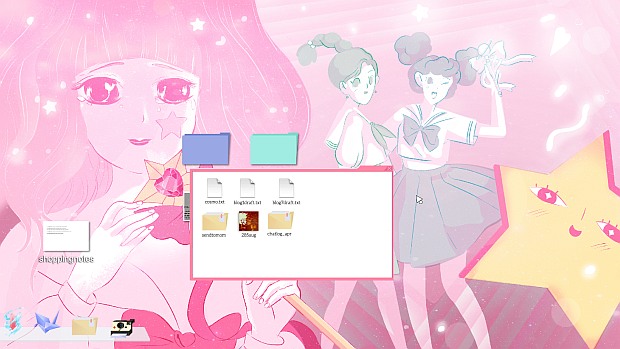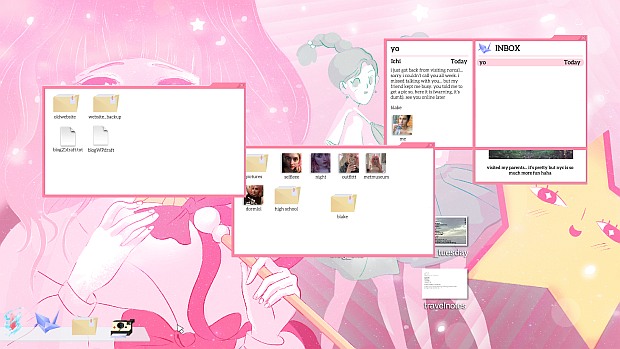Cibele Is A Love Letter To MMO Communities
An auto-biographical romance.
Long before always-online games and mass multiplayer became the norm, MMOs were seedbeds of sociologically fascinating interactions among players. The base game was always a digital sandbox; empty cities, towns, and fields built from the ground up around the assumption that the players would fill them with requisite life. In the process, elegant spider webs of informal community became the norm, a glittering metagame linking the digital assets of the formal game itself.
But until Nina Freeman’s soon-to-be released Cibele (pronounced SIB-ul), we haven’t really had a ludic love letter to this shared reality of many MMO gamers. The game tells a semi-autobiographical story of its creator, Nina, about a months-long romance she carried on when she was 19 through an online game, fictionalised here as Valtameri, which seems like a WoW/FFXIII hybrid.
Cibele [official site] defies easy genre categorisation. You interact almost entirely through pointing and clicking. Play is spread over three chapters with two phases each. In the first phase you’re at Nina’s desktop, able to look through her files, photos, chatlogs, homework assignments, and even her poetry. The whole experience is oddly immersive, making for the only time I can recall where I was happy that a game was fullscreen-only. It really felt like I was at Nina’s computer, checking her emails, and assembling the narrative puzzle of her life. This gives the game a voyeuristic quality, to be quite sure, but rather than acting as an outside investigator (as you do with a similar interface in Her Story), you’re actually meant to inhabit Nina’s subjectivity here. This is no small part of what makes the creation of this game a profound exercise in vulnerability.
The second phase begins when you click on the desktop icon for Valtameri, opening up the familiar interface of an MMO where you log in using Nina’s beloved, spear wielding character, Cibele. If you had poked around Nina’s desktop you would find that she had become smitten with a young man in the game whose character name is Ichi; it is him that you/Nina log in to play with, killing monsters while you two have awkwardly romantic banter on voice chat. The beautifully acted dialogue lends a lot of life to the game and feels strikingly authentic. It helps to give the game its most distinctive feature, which I alluded to at the start of this essay: it foregrounds the metagame of multitasking multiple social networks while grinding in an MMO.
This phase of the game is frenetic. Valtameri itself isn’t terribly challenging or exciting; you run around with Ichi, target enemies by clicking on them and kill them until a boss appears, which feels like a delightful bit of snark about the bread and butter of MMO gameplay. But the real challenge is in both paying attention to the spoken dialogue, answering several in-game private messages from friends while carrying on and absorbing the disparate conversations with them, and alt-tabbing out of Valtameri to look at emails and photos. All while grinding on those mobs in Valtameri. Even though each action can be completed with a click--even responding to private messages is done by clicking reply to make Nina’s response appear--it is still an interesting juggling act; I’d have preferred dialogue trees to add a layer of choice and challenge to it all, but I respect that this is autobiographical at the end of the day.
I found myself resurrecting a favoured old tactic of mine from World of Warcraft, which was to target and auto-attack an enemy and use that time to quickly type out replies to messages or alt-tab out to check my IMs and email. It enabled me to still play while managing the social metagame, and that experience is very effectively recreated by Cibele.
The shallow nature of Valtameri’s gameplay just serves to surface the game’s true subject: the virtual network on which Nina’s budding affections for Ichi are being played out.
There are no consequences for failing to answer messages or read emails, but you lose out on the game’s signature experience in doing so, as well as context for all the dialogue you’re listening to. Both Nina and Ichi are young, nerdy gamers, unlucky in love and deeply inexperienced with relationships (they’re each other’s first, as it happens), but you are able to more fully plumb Nina’s motivations; her social anxieties about not being well-liked in school as well as her body and what she perceives to be her own unattractiveness and undesirability, her deep love for anime and videogames and how she often uses them to escape.
Nina is indisputably a nerd, but it’s not hard to imagine how many other games or movies would make a thoroughly unsympathetic character out of this 19 year old, her voluminous selfies, and her emotional poetry. But this is a game about gaming and romance that centers the experience of a 19 year old young woman, and in the process humanises that much-loathed figure in contemporary discourse: the millennial, tech-savvy girl. Her computer is filled with photos of herself, some carefully posed, others more ‘natural,’ many that she’s kept to herself, a few she’s shared on her blog--and, as the chapters progress, several risque ones she’s sent to Ichi. But instead of the content-free anti-selfie, crypto-misogynist bitterness that pervades thinkpieces and messageboards alike, the game helps you understand what those photographs mean to Nina; they’re how she understands herself, explores her body, and works through her anxieties.
The self-framed photograph has tremendous power here, and is one of the primary windows you have into Nina’s struggles, growth, and personality.
The game was a profound illustration of a time of my life that I remember with a mixture of nostalgia and embarrassment; so much of Cibele will inspire similar feelings in those who carried on similar romances in their own MMO experiences. While playing in Valtameri, you/Nina cautiously discuss the possibility of meeting in person, and as you do so you receive an email responding to an inquiry Nina made about airline tickets showing various flights from New York to Los Angeles, where Ichi lives. That moment nearly moved me to tears; so long ago I had been furtively browsing Orbitz and Expedia for cheap plane tickets to visit a young woman with whom I shared a mutual crush. The time Cibele and Ichi spent grinding in game reminded me of my long hours sitting and chatting in Stormwind with my own crush, talking in party chat until dawn, or the hours we spent in Lower Blackrock Spire playing together.
Cibele is a summoner of powerful memories, and the reality-blurring complicity its mechanics inspire in the player all but ensure this. I played as Nina, and in so doing was transported back to my own lonely, dysphoric years struggling with the feeling that I’d never be loved, trying to explain to my friends that World of Warcraft was more than just a game. Like me, Nina spent far too much time in-game because it gave her what the physical world seemed unable to; love and acceptance, a sense that I was “normal,” whatever that meant.
The game is a sparkling brew of media; its live action cutscenes, which premiere between each chapter, star Nina Freeman as herself, re-enacting these pivotal moments of her early adulthood. As I wrote earlier, everything about this game is vulnerable in its intimacy and constitutes both a work of art and an act of courage. It is fine reminder, as if we needed one, that even tight-focused, personal introspection can yield insights relevant to us all. Freeman has crafted a game that, in engaging with a complex event in her own history, sheds a lot of light on everything from being a nerdy woman, to online games, to high school and early college friendships, to love and sex itself.
Far from the cliches and ignorance of much mainstream gaming when it comes to romance, this is a game that humanises its awkward protagonists. While I found Ichi to come off as a bit of a jerk at times, I nevertheless found myself understanding and sympathising with him as well. In his own way, he was struggling with the male mirror of many of Nina’s own anxieties and struggles, and while I rolled my eyes at him, I couldn’t hate him.
It’s incredible what a little empathy can do.
Cibele is due for release on November 2nd for Windows and Mac.





